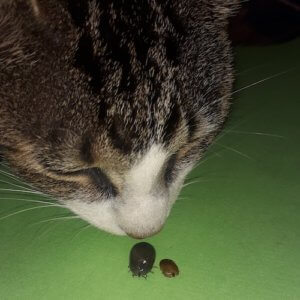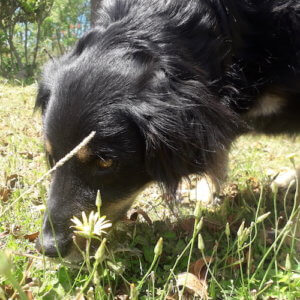Vaccinations -
If you fell for the “festive buy”, trust me, you’re not alone. Or perhaps you’ve missed our last blog and are now a few puppies or kittens richer – if so, this blog is for you.

What is vaccination?
Vaccines are a fascinating invention that help our pets to fend off disease.
- A vaccine is a preparation that uses either a weakened, live, disease-causing organism, or an inactivated, dead particle of the organism.
- It’s given to healthy animals by injection under the skin.
- It stimulates the immune system to be primed and ready to fight specific infections.
- If a vaccinated pet comes into contact with the infection it’s been vaccinated against, its immune systems will recognise it.
- Your pet’s immune system can then make antibodies to kill the bug before it can cause disease or spread to others.
Why do we vaccinate?
Thanks to effective vaccinations, disease outbreaks have been dramatically reduced. In fact, some diseases have been virtually eradicated.
We vaccinate both to protect individual patients, and to create herd immunity. With adequate herd immunity, other animals are protected too. If pets are vaccinated, they are protected from the disease themselves, and are also less likely to spread the bug to other individuals and the environment around them.
What do we vaccinate against?
Routine vaccinations for dogs
- Parvovirus – better known as “cat flu” or “katgriep”, because it is thought that the virus originated from Feline Panleukopenia virus in the 1970’s. This awful bug causes terrible, haemorrhagic diarrhoea and vomiting. It is often fatal in unvaccinated puppies. Unvaccinated adults dogs can develop a mild diarrhoea, and even though they can survive with mild symptoms, they usually spread the virus far and wide, causing an outbreak and casualties in pups.
- Distemper – a nasty, very infectious and virulent virus causing a multitude of clinical signs including vomiting, diarrhoea, and respiratory symptoms leading to pneumonia, mucky eyes, severe neurological symptoms and even seizures. Distemper in an unvaccinated puppy is almost always fatal. If the puppy survives, they often develop an “old dog encephalitis” when they are older. This causing neurological symptoms.
- Adenovirus – a hepatitis-causing virus.
- Parainfluenza virus – causes flu-like symptoms.
5. Rabies virus – it is compulsory by South African law for dogs and cats to be vaccinated against rabies. Rabies is a zoonotic disease, which means that humans can also get it. Sadly, it’s fatal for both humans and unvaccinated pets. For more detail on this tragic disease, you can visit the Centers for Disease Control and Prevention.
Routine vaccinations for cats
- Kennel cough – caused by the bacteria Bordetella bronchiseptica. This bug provokes an irritating cough. Even though it is not usually fatal, it is very contagious, and can cause a secondary pneumonia if ignored. It is easily treatable by a course of antibiotics if caught early.
- Feline Rhinotracheitis virus – this is one of the viruses causing “snuffles”. Cats present with sneezing, mucky eyes and snotty noses. Because they cannot smell or breathe properly, their appetite suffers; they become more debilitated and can die because of secondary infections. It is very contagious and can lead to chronic infections.
- Feline Calici virus – another one of the viruses causing “snuffles”. Infected cats often have mouth ulcers, stomatitis and glossitis, or inflammation of the gums and tongue.
- Feline Panleukopenia – also called feline parvo. It causes vomiting and diarrhoea, among other problems. It lowers the white blood cells, affecting a patient’s ability to cope with infection.
4. Feline Leukemia virus – a nasty virus affecting cats of all ages, transmitted mainly by cat bites, mutual grooming and close contact.
- Rabies virus – it’s just as fatal for cats.
When should I vaccinate?
Dogs
- 6 weeks: 5-in-1
- 9 weeks: 5-in-1 plus Kennel cough
- 12 weeks: 5-in-1 plus Rabies plus Kennel cough booster
- 16 weeks: Rabies booster
- 15 months: 5-in-1 plus Rabies
Thereafter booster vaccinations will be advised on during annual health checks based on individual needs.
Cats
- 8 weeks: 4-in-1 plus Feline Leukemia
- 12 weeks: 4-in-1 plus Rabies plus Feline Leukemia booster
- 16 weeks: Rabies booster
- 15 months: 4-in-1 plus Rabies plus Leukemia
Thereafter booster vaccinations will be advised on during annual health checks based on individual needs.
What are the risks?
Vaccine reactions are very rarely seen in practice. The benefits of effective vaccinations far outweighs the risks. A few uncommon effects to look out for include a mild transient swelling under skin at the injection site. This is usually completely painless and should disappear after a few days. Some pets can develop slightly swollen glands a week or two after vaccination. They should feel normal again after a few days.
More severe reactions have been recorded but are extremely rare.
Working together to keep pets happy
Whether rescue moggy or purebred pedigree, let’s keep our furry friends healthy and safe, and help stop the spread of these terrible, preventable diseases.













